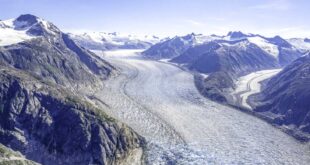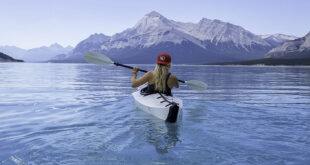A year after my dad died, I embarked on a hike into the mountains. My father, James Michael “Jim” Johnston, had asked to have some of his ashes spread at his favorite place, Lake 22, a lake high on the east flank of Mount Pilchuck in the northern Cascades of Washington State. To my dad, it was a very special place, and where he discovered who he was and who he would become. In the truest sense of the words, I was taking him home.
It was on Mount Pilchuck that Jim experienced the first rush of freedom, independence, and deep self-confidence. When he was eleven years old, his parents drove their gold Buick Skylark up the dusty summer mountain roads. Jim sat in back on the edge of the white vinyl seat, surrounded by his camping and fishing gear. His parents dropped him off at the trailhead and he hiked up the mountain to Lake 22. There, he made camp, and went fishing and hunting for the weekend, by himself.
His life had formed a strong current, from boyhood enjoyment and soul connection to defending and improving and always loving the region and its waters. I hadn’t understood the connection before that moment.
On June 23, 2022, I set out on my own journey to Lake 22. I’d never been there and I went alone, not by necessity—many of my friends had offered to come with me—but so I could be closer to my dad and feel some of how he felt going there alone.
The funeral home had given us a large wooden urn to hold most of his ashes that would be interred at his gravesite. They also gave us two plastic pill bottles with ashes for spreading where he wanted to be laid to rest. My mom had one, and I had one. That little orange bottle was the most important container in the whole world. The typed label on the side read:
JAMES MICHAEL JOHNSTON
DOB 2/18/1943
DOD 6/13/2021
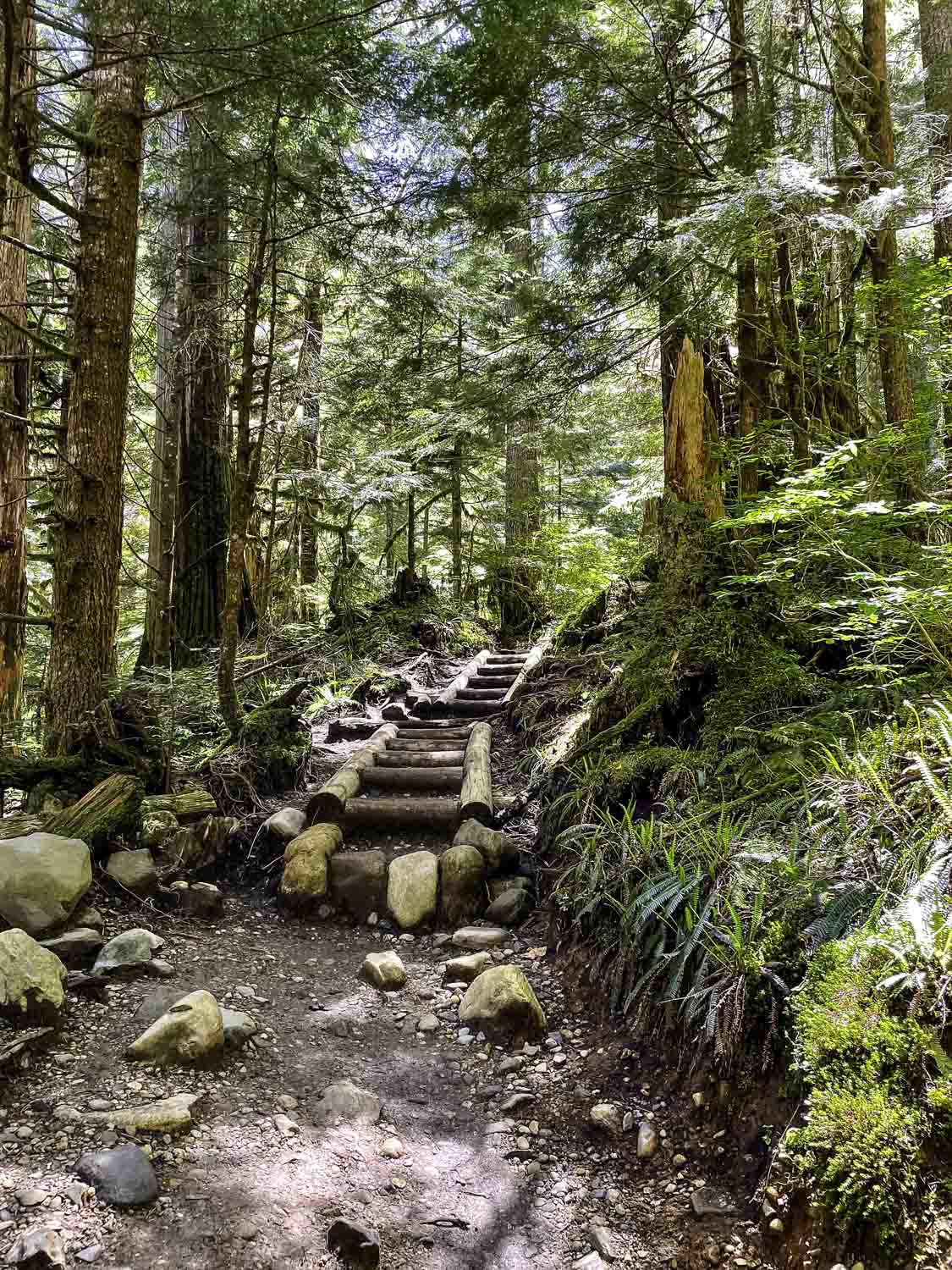
As I drove out through the green fields and rolling pastures of Arlington, I started talking to my dad. He was very far away and very close. I could almost smell the faint comforting smoke of his cigarette drifting back into the car through the partially opened window. This happened thousands of times in my childhood: window rolled down an inch, yellow flare of a match, first drag, smoke swirling, feeling safe, Dad driving our truck.
I wondered if he was listening. I think he was. The farther I drove, the nearer to the mountain, the closer I was to him.
I talked to him: I bet when you were a kid, you loved watching these lowlands change into the bigger trees and forests and felt a thrill, a homecoming when you saw Mount Pilchuck.
As I drove, the landscape became less tamed, more wild, and the scattered homes faded into dense forest. I knew my destination, but wasn’t certain of my route. Just outside Verlot, I stopped at the Mountain Loop Store and bought a National Forest Pass and a map.
Ten minutes after leaving the store, I crossed over the Stillaguamish River, an important place for my dad, who had—in his work with the Department of Fish and Wildlife—protected the Stillaguamish from logging and development that would erode its water quality and be detrimental to the fish and habitat of all the nature in those parts. His life had formed a strong current from boyhood enjoyment and soul connection to defending and improving and always loving the region and its waters. I hadn’t understood the connection before that moment.
I followed the river upstream, parked my car near the trailhead, and filled my pack with everything I’d need for the day. My fly-fishing pole was in the same red case I’ve had since age seven, when my dad gave it to me. I took some deep breaths. I started up the mountain.
Oh, what a beautiful trail! Radiant green and towering old-growth forest. Babbling streams and wooden footbridges. Ferns poking out of everywhere and moss on nearly everything else. Water running over rocks from snow melting above. Summer in full celebratory swing—birds singing, sunlight slanting through cedar boughs. There is a woodsy smell here that sneaks in on smoky motes of pollen, cedar, and cinnamon. Nature has always been my church, my dad’s greatest gift to me. I was among the trees in a sacred place.
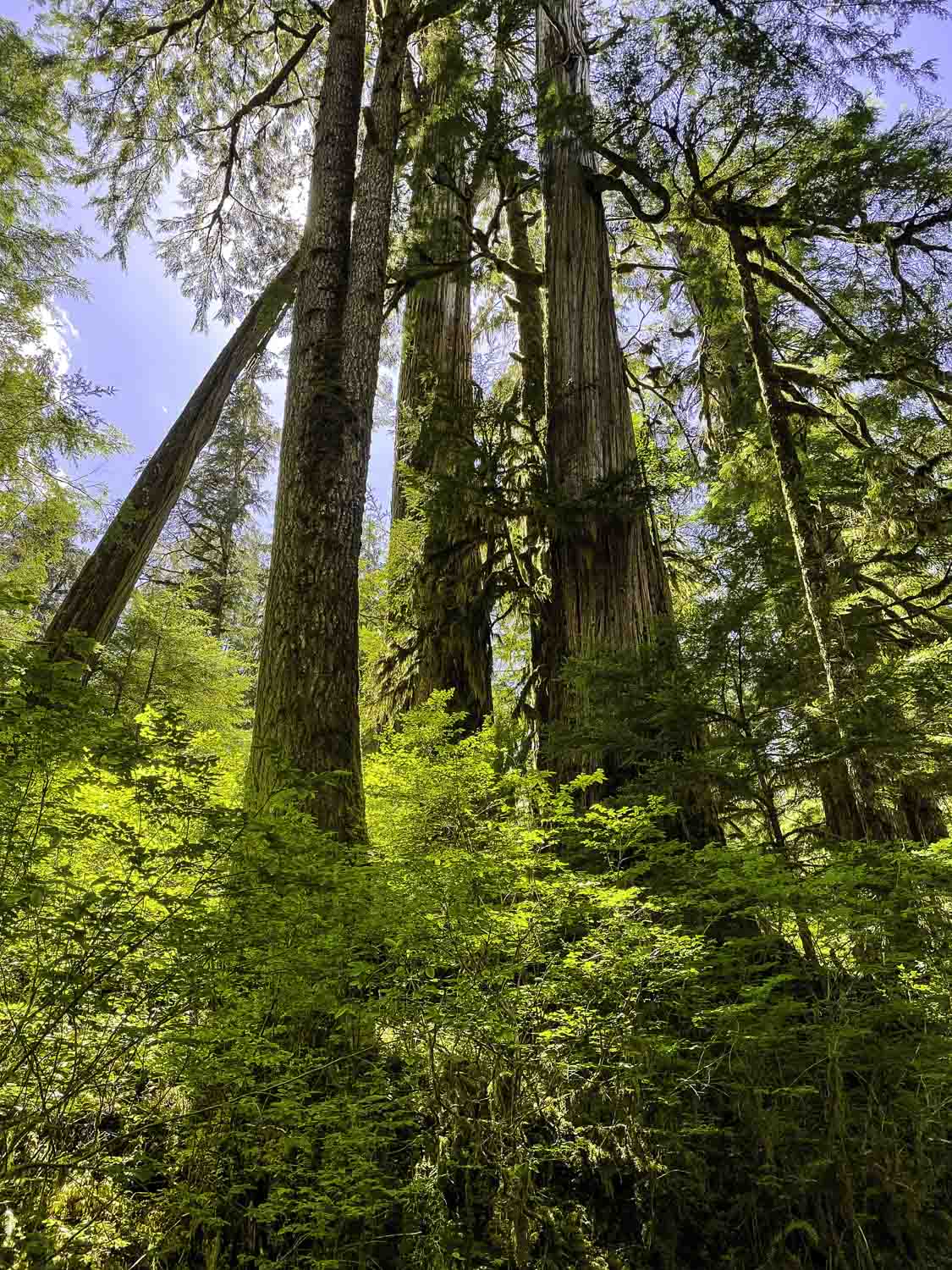
I hiked up the mountain, feeling like I was holding Dad’s hand. Our last time. As I walked, I talked with him and cried and smiled and laughed, and remembered so many things about him. His steadiness. His strength. His love. His critical mind. His big heart wanting to love and be loved.
Pain and love ebbed and flowed as I breathed the forest in and out. I thought of Dad’s deep, omnipresent love for nature and his commitment to it. His love and respect for his parents. His marvelous hands that created so much and put my sister and me to sleep with backrubs. His brilliant mind and powerful control of almost every situation. His art and all that he brought to life artistically. The bronze fish belt buckle that he wore every day. His hour-long pontifications on human history, how to be a leader, so much science and natural-world wonder, and my silent and often-couldn’t-sit-still attendance at these lectures. His raising of me and my sister, his disappointments and criticisms, and unwavering deep love for us. All he taught me. All of it.
I love you, Dad.
The day was warm, sunny, and humid. The effort of hiking made it an intense climb. It was only 3 miles and just 1,300 feet of elevation gain, but I was really sweating. I arrived at a waterfall, 30 feet above a mist-swirling pool, so powerful and loud and an intense rushing full of life, I could only stop and stare. It breathed into me with mist and force and uplifting ions. The clear pool and the spray filled the air around me, and droplets jeweled the heavy-hanging evergreens. The spray settled on my skin: cold, crisp, welcome, and cooling.
And trees! The trees were wonderful to behold. Giant cedar and Douglas fir. Skyrocketing majestic sentinels. Skywalkers. In some places, the trees stood in a circle around me, holding each other with their long, branching arms. This forest was my dad’s first and last church. Conifers in congregation. A fellowship of evergreens.
I know you loved these trees, and they spoke to you like they are speaking to me. The winds through the trees are whispers of ancient wisdom.
Arriving at Lake 22 is like stepping out of the woods onto a different planet. From the dense forest, a sturdy footbridge with log railings crosses the outlet of Lake 22 Creek. A half-circle of vertical mountains striped with countless waterfalls rises majestically.
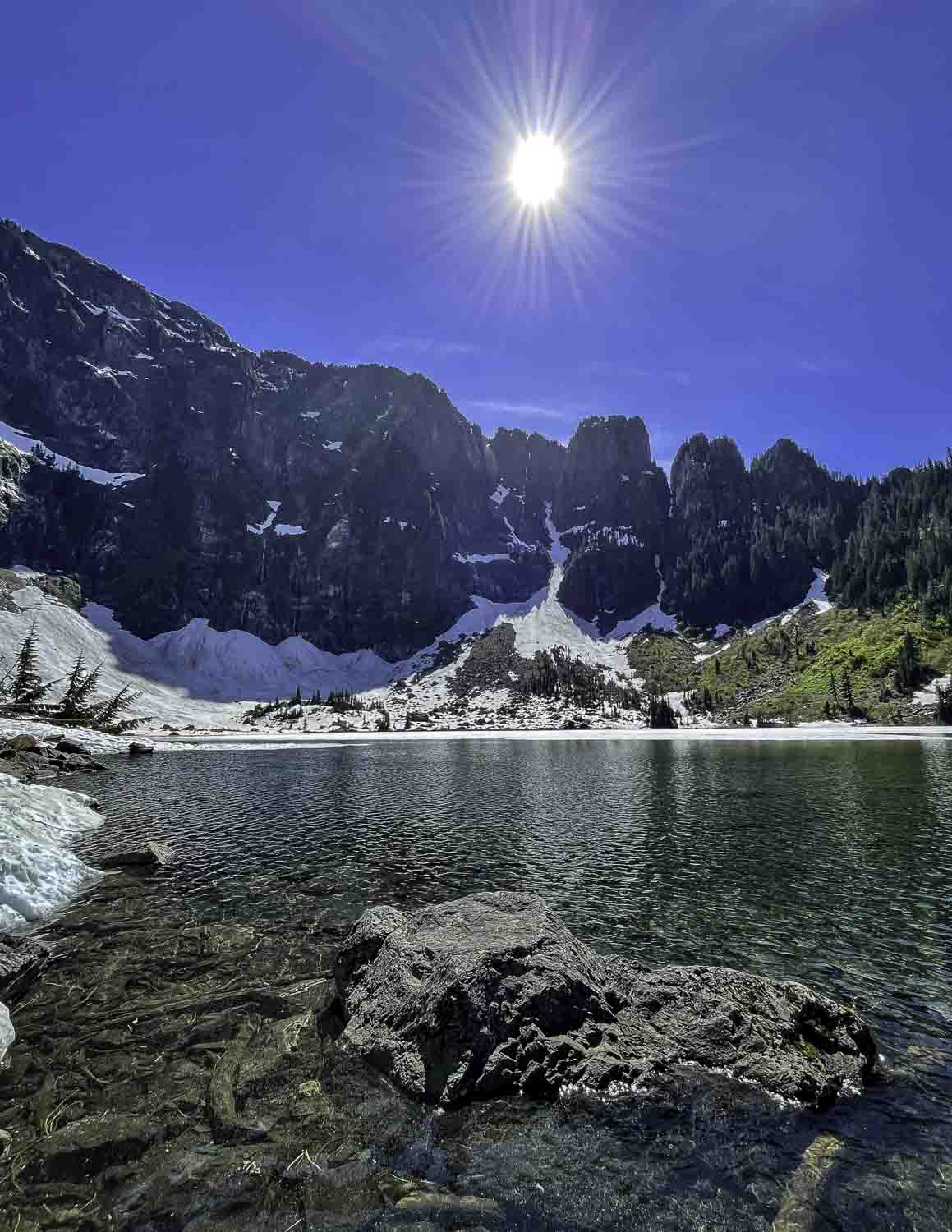
The sound you hear is not the wind; it is the waterfalls—a spirit-lifting shhhhhhhhhhhhhh, like angels hushing the world to peace. Snow pockets dot the ramparts and give depth and clarity to what feels like too much to take in.
The lake is held by the sharp ridges of the mountain, the strong arms of rock embracing lush mountain meadows. Its surface is still frozen under snow and ice and but there is open water closer to the outlet; bright and sparkling, crystal clear, and mineral green. White floes of ice six feet long slowly glide toward and under the footbridge, melting as they go, ghostly shapes surrendering one form for another. Water to clouds to rain or snow, to runoff to ocean to evaporation, again and again, as my dad taught me.
I walked around the lake until I found a rock I could jump to out in the water. Later, at home, my son, Henry, looked at the photo of the rock and said that it looked like the skull of a dinosaur. “It’s definitely a T-Rex,” he said.
I sat on the rock in the lake and talked to Dad.
Where did you set up your campsite the first time you came here by yourself? Were you really only 11 years old? I remember you telling me that when you first arrived you had such a good feeling and thought: ‘Oh this is going to be fun!’
I told my dad how much I missed him, that I loved him, and that I wished we had spent more time together. I said I was sorry for that lost time and hoped we could forgive each other, and ourselves, for the things that had separated us.
My eyes searched the brilliant blue sky, the shadowed rocky cliffs and mountains, and down into the clear green lake. I said, You always asked me to bring your ashes to Lake 22 and to Mount Pilchuck and help you be part of this place again, to be laid to rest in your first and favorite place, where you felt you became yourself, found yourself. Welcome home, Dad.
I poured a small mound of his precious ashes into my hand and cast them into the lake. Some of his stardust settled gently onto the lake bottom, where small bone fragments were indistinguishable from rocks. Some of his ashes floated in a wide, smoky heart shape, mixing with the snowmelt on the lake’s surface. The image stayed like that. I thought it would dissipate, but it stayed with me the whole time I sat on that rock. The choir of waterfall angels sang shhhhhhhhhhhh.
I did not want to leave the rock. I felt hugged in warm sunshine and peace of the mountain and lake—maybe the first time I have ever felt the word serenity. But I had something important I needed to do. Back on the shore, I set up the fly fishing pole Dad gave me 43 years ago and put on a fly that he had tied—choosing one that looked like the bugs around me and on the lake’s surface—like he taught me. I fished for myself and for my dad. It would have made him happy to see, and maybe he did. I believe he was with me. I didn’t catch any fish but that wasn’t important. It was vital to cast for my dad in memory and love and gratitude for all that he taught me. To fish with Dad one last time.
Wandering back along the lake path, I was about to leave the lake but saw a blooming patch of mountain flowers next to the trail. I had a strong sense that they had been growing there every spring for hundreds of years. I sprinkled some of my father’s ashes around the flowers, saying, Dad you loved flowers so much, and showed me how to see so many plants and animals. I know you would want to be a part of these flowers.
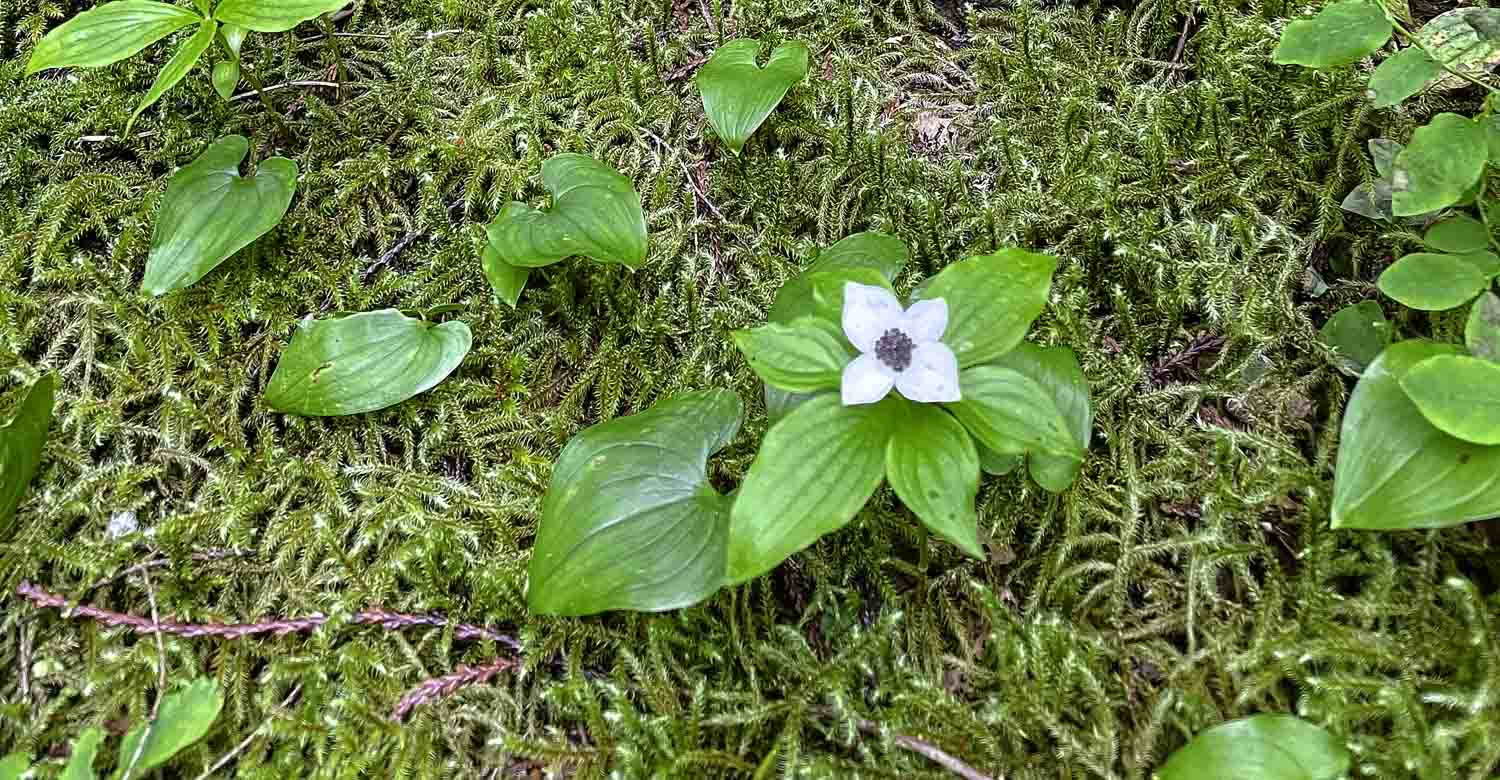
As I walked down the mountain, I spread small amounts of my dad’s ashes into areas where his favorite plants were growing, naming the plants and telling him where he was being given a new home: a grandpa tree stump raising small fir and cedar and huckleberry (he loved his grandchildren Kaila and Henry so dearly), huge cedar, devil’s club, salmonberry, maple, fern, and a few flowering plants that I wished he was there to identify.
At the foot of the mountain, I spread the last traces of his ashes in Lake 22 Creek, kneeling beside the bridge. Goodbye, Dad, I love you. You’ll be in the Stillaguamish soon. I will see you again. Peace, big spirit.
Arriving at the car, I was tired, aching, blistered, and spent. At the same time, I felt lighter and shifted, peaceful in my heart.
Mount Pilchuck and Lake 22 were always hallowed ground for my dad, and now that I had accompanied him there to his final resting place, it was holy for me as well. I can always come back to his lake, our lake, and say hello to my dad and my memories.
On a snowmelt spring day, you can stand on the wooden bridge above the outlet stream, the beginning of Lake 22 Creek, and as the cold clear water and snow glides under you, and as you look to the wall of mountains at the far side of the lake, you can feel Jim Johnston and hear his voice in the waterfalls and know he is home. And maybe a part of you will be as well.
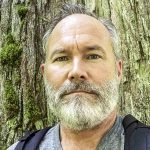 David Johnston is writing a new book about photography and relationships. He redeveloped historic buildings for many years, placing ten buildings on the National Register of Historic Places. He supports the arts and the environment and has created scholarships at WWU, WCC, TESC, and UH. The ocean and forest are his church. Lake 22 is his first book.
David Johnston is writing a new book about photography and relationships. He redeveloped historic buildings for many years, placing ten buildings on the National Register of Historic Places. He supports the arts and the environment and has created scholarships at WWU, WCC, TESC, and UH. The ocean and forest are his church. Lake 22 is his first book.
 AdventuresNW
AdventuresNW



